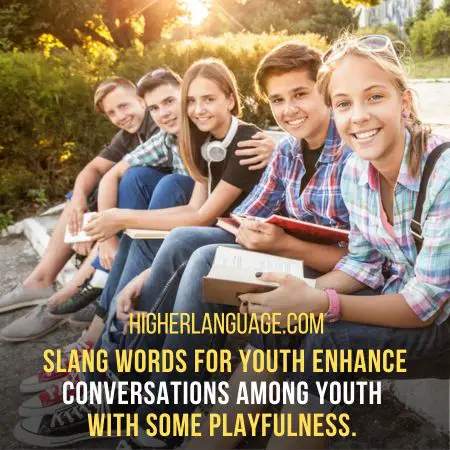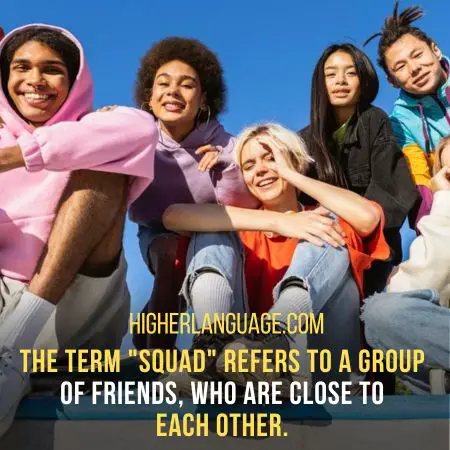Slang words for youth enhance conversations among young people while adding a bit of playfulness.
[toc]
The youth come up with unique words to communicate and express themselves. In this article, you’ll learn the basic slang words for youth.
Slang Words For Youth
Slang words are a part of the everyday vocabulary of many young people. It can be difficult for adults to understand the jargon teens and tweens use.

Learning the terminology of today’s youth is essential to stay connected with them.
Here are some popular slang words that your kids might use.
1. Woke:
The term “woke” is one of the slang words for youth. It is used to describe someone aware of the social and political issues happening in the world.
For example, a person might say “stay woke” when talking about staying up-to-date on current events.
2. YOLO:
This is one of the common slang words for youth. This acronym stands for “You only live once”.
It expresses that people should take chances and live life to the fullest. It refers to those who enjoy life because they don’t get a second chance.
3. Turnt:
This is another slang word for youth. This term describes someone excited, hyped up, or feeling energetic.
When someone’s “turn,” they’re ready to go out and have a good time.
4. Looking Good:
This is one of the slang words for youth. This slang term describes someone or something on point or perfectly put together.
It can express approval and admiration of a person’s style, look, or attitude.
5. No Cap:
“No cap” means “no lie” – it’s used when people want to emphasize that what they’re saying is true.
It’s often used in response to friends or family members who don’t believe what they’re saying.
6. Goals:
This slang term is used to express admiration for someone or something. It’s used when referring to a person you think is attractive, successful, or inspiring.
It can refer to something that isn’t necessarily ideal but still admirable.
7. Vibin’:
The term “vibing” is used to describe someone who is feeling good and enjoying the moment.
It can also be used to refer to someone who is in a relaxed and positive state of mind.
For example, if someone was having a great time with their friends, they might say, “I’m vibing”.
8. Bae:
It is one of the slang words for youth. This is an affectionate term that stands for “before anyone else.”
It refers to a significant other but can also be used when discussing friends and family.
This term has recently become popular to express endearment towards someone special.
9. Ship:
This term describes an imaginary relationship between two people, usually celebrities or fictional characters.
It’s most commonly used as a verb (e.g., “I’m shipping them!”), but it can also be used as a noun (e.g., “They make such a cute ship!”).
This term has become popular recently due to TV shows and movies featuring characters’ relationships.
10. Squad:
This term refers to a group of friends, usually close ones.
It’s used as a collective noun when referring to multiple people but can also be used about a single person.
His term has become popular among teenagers and millennials in recent years. It is used as a way to talk about their friend groups.
11. Lit:
It is one of the slang words for youth. This term is used to describe something exciting or interesting.
It can also be used to refer to a person who is having an especially fun time or wearing fashionable clothes.
Recently, this term has become popular for expressing enthusiasm for an event or activity.
12. FOMO:
This term stands for “fear of missing out”. It’s used to describe a feeling of anxiety about not being included in events or activities.
It can be used to discuss someone obsessed with keeping up with the latest trends and culture.

This term has become popular as social media has made exposure to different experiences easier.
13. Stan:
This term refers to an enthusiastic or obsessive fan of a celebrity, musician, or other public figure.
It originates from Eminem’s song “Stan,” which tells the story of an obsessed fan. It can be used as both a noun and a verb.
For example, “I’m such a stan for that artist!”. It is commonly used as more people take to social media to share their admiration for public figures.
14. Tea:
This term is used for gossip or news. It’s often used as an abbreviation of the phrase “spill the tea,” which means to divulge information.
This term has become increasingly popular in recent years as a way to talk about news informally.
The term has gained traction in the LGBTQ+ community and among those who use drag culture language.
15. Flex:
This term is used to describe someone who is showing off their wealth or possessions. It can be used as a verb (e.g., “He’s always flexing his new car”).
It is used to boast about one’s accomplishments or possessions.
This term is often used for material objects but refers to other things, such as skills or talents.
16. Thirsty:
This term is one of the slang words for youth. It describes someone desperate or eager for something (e.g., attention, validation, praise).
It can be used as an adjective (e.g., “Don’t be so thirsty for his approval”).
It describes someone behaving too aggressively or eager to get something they want.
This term is used about people trying to gain someone else’s attention. It can also refer to situations where people are too eager to do something.
17. Ghosting:
This term describes the act of cutting off communication with someone without explaining.
It can be used as a noun. For example, “That was such a ghosting move,”.
t has been used in recent years to talk about the phenomenon of ending a relationship without any warning.
Ghosting has become a widespread problem in dating. It can also occur in other relationships.
19. Canceled:
This term is used to describe publicly rejecting or denouncing someone. In recent years, calling out bad behavior has become increasingly popular.
It can also be used in other contexts (e.g., “That movie was canceled by critics”).
The term is often used about celebrities or other public figures, although it can be used in any context.
It is sometimes used sarcastically to express disappointment in oneself or someone else.
20. Low-key:
Low-key is one of the slang words for youth. This term describes something that is done quietly without drawing attention to itself.
In recent years it has been used to talk about activities that don’t require much effort.
It can also be used to describe people (e.g., “She’s so low-key”) or ideas (e.g., “His plan is surprisingly low-key”).
21. Throwing Shade:
This term is used to describe when someone is subtly insulting another person. It can also be an alternative way of saying “fighting words”.
For example, if someone said something mean about another person, they might be accused of throwing shade.
22. Finna:
The term “finna” is an abbreviation for “fixing to”. It is one of the slang words for youth.
It can describe someone about to do something or when someone is in the process of doing something.

For example, if someone was getting ready for dinner with their friends, they might say, “I’m finna head out”.
By understanding these slang words for youth, adults can better communicate with them and understand their conversations.
Learning about people’s current vocabulary in everyday conversations can be fun.
With this knowledge, adults can participate in conversations with youth more seamlessly.
Conclusion:
Having grown up in a digital-first world, it’s no surprise that today’s youth have developed their own slang words.
Many adults don’t understand these terms. They are still widely used among teenagers and young people worldwide.